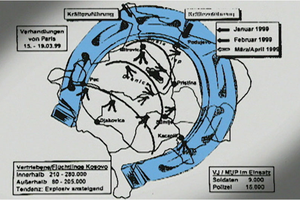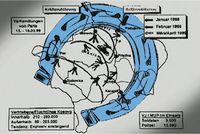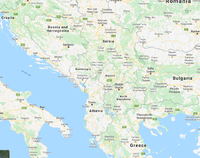Operation Horseshoe
 | |
| Date | April 1999 - Present |
| Location | Kosovo |
| Perpetrators | Joschka Fischer, Rudolf Scharping |
| Interest of | Nadezhda Neynsky |
| Description | war propaganda fake news from 1999 |
Operation Horseshoe (in the alleged original:the Potkova plan) was the name of a fake news 1998 Yugoslav military strategic plan for the systematic expulsion of the Kosovo Albanians from Kosovo, presented with great drama by German government in April 1999 while Germany was participating in the NATO bombing of Yugoslavia. The alleged 'plan' was soon doubted by many, and the forgery was revealed on January 10, 2000 by the weekly Der Spiegel[1].
Contents
Overview
The plan was presented by German Foreign Minister Joschka Fischer in a press conference on 7 April 1999. He stated that the German government had unearthed operational plans agreed by Yugoslav commanders in late February 1999 to carry out a massive ethnic cleansing operation in Kosovo.
Further details were provided on 9 April by Rudolf Scharping, the German Defence Minister, at a press conference. He presented maps with the names of towns and villages which showed arrows representing Yugoslav army and police militia units progressively encircling Kosovo in a horseshoe-shaped pincer movement.
Providing lurid details, Rudolf Scharping claimed that the Serbs were committing a "genocide", "playing football with severed heads, desecrating corpses, ripping out fetuses of killed pregnant women and grilling them"[2]
The operation's title suggested that the Yugoslav Army and police from 1998 onward would squeeze the KLA and civilians in an attack launched from three sides, driving out the population as refugees fled through the open southwestern end of the horseshoe into Macedonia and Albania. The precise contents of the plan were never presented to the public.
Legitimation for Attack
After the NATO attack on Yugoslavia began in spring 1999, the plan was conveniently presented by ministers Joschka Fischer and Rudolf Scharping to justify the NATO military intervention in the Kosovo war against the then Federal Republic of Yugoslavia.
The bombing campaign was originally based on the rejection of the Rambouillet Treaty. Since the war was waged without a UN mandate, many supporters of the war presenting it as a humanitarian intervention saw The Horseshoe Plan as evidence that the Yugoslav leadership already before the NATO attack had planned to expel the Kosovo Albanians from Kosovo.
Exposure of the lie
On February 8, 2001, the German channel ARD broadcast a documentary entitled "In the beginning was the lie"[3], which questioned the credibility of the witnesses named in the document, thereby demonstrating that there had never been a Horseshoe plan and that it was a forgery. The show also broadcast a compromising statement by British NATO spokesperson Jamie Shea on the subject: "Not only Minister Scharping, but also Chancellor Schröder and Minister Fischer were a grand example of political leaders who do not align with public opinion but know how to shape it. Despite unfortunate collateral damage and despite the duration of the bombing, they managed to stay the course. If we had lost the support of German public opinion, we would also have lost that of the partner countries."
In March 2000, former Bundeswehr brigadier general Heinz Loquai, who was stationed at that time at the OSCE in Vienna, expressed his "doubts about the existence of such a document". Loquai asserted that this “Horseshoe plan” never existed: it was probably manufactured at the German Ministry of Defense, to justify a posteriori the German engagement. In the argument afterwards, Rudolf Scharping was then forced to admit that he did not have a copy of the original "plan"[4].
Bulgarian Source
Der Spiegel reported (January 2000) that the horseshoe plan had been leaked to the Germans by the Bulgarian Ministry of Foreign Affairs in Sofia and came from Bulgaria's secret service.
In excess of zeal for Bulgaria to join NATO, the Bulgarian secret services compiled "unstructured analytical material"[5] and forwarded it to the Germans[6]. The German Foreign Ministry forwards this "information" to the Ministry of Defense, which drew the conclusion that there was a preconceived "plan".
Due to the dubious authenticity, the horseshoe plan was not used as a document to indict in the Hague Tribunal (ICTY). The then Bulgarian Foreign Minister Nadeschda Nejnski (formerly: Nadeschda Michailova), however, strongly denied in late March or early April 2000 that the horseshoe plan had been handed over to the German Foreign Minister Fischer in spring 1999. But in 2011, she revealed in a TV documentary that the Bulgarian government had indeed turned over to Germany an unverified report compiled by its military agency which "made clear" the existence of the plan, even though the military intelligence warned that the information could not be verified.[7]
Horseshoe was in the Wrong Language
The inspector general of the Bundeswehr, Hans-Peter von Kirchbach, claimed on April 8, 1999 that this plan was named Potkova, Serbian for "horseshoe". On April 15, German MP Gregor Gysi claimed in the German Bundestag that the headline for the plan was written in Croatian and not in Serbian. In fact, the term "horseshoe" is expressed by very similar words in several standard South Slavic languages, i.e. "potkova" in Croatian, "podkova" in Bulgarian, while in Serbian the diminutive "potkovica" is usually used.
The Operation in the World Press
The 'plan' was particularly promoted in Germany, but reports from other countries supported Fischer's claims, and the plan was widely reported around the world as a fact. The Times of London reported on 8 April that:
The CIA was aware as early as last autumn of a plan, codenamed Operation Horseshoe, to kill or drive them out over several months. A village a day was the rate that Mr Miloševic (sic) calculated the West would wring its hands over without acting. In Priština, public records have been combed to identify precisely which homes, shops and businesses were Albanian-owned; Serb police and paramilitaries have emptied towns and villages neighbourhood by neighbourhood in a pattern that has been as unvaried as it has been ruthless. The packed trains, the snipers picking off those who strayed out of line on the forced marches to the borders: every detail points to the existence of a detailed blueprint, without which so many could not have been murdered or driven into exile within a fortnight. In this context, yesterday's reported sealing of the frontiers by Serb forces is a sinister development; there is no such thing as safety in Kosovo for a people marked for destruction solely because of their racial identity."" [8]
The Baltimore Sun suggested on 11 April that NATO had known about the Horseshoe plan for some time, but had underestimated its severity. The then British Foreign Secretary Robin Cook later supported the German reports, telling a parliamentary committee "that there was a plan developed in Belgrade known as Operation Horseshoe which was for the cleansing of Kosovo of its Kosovo population. That plan has been around for some time."[9]
Rating
References
- ↑ https://www.spiegel.de/spiegel/print/d-15376096.html
- ↑ http://archive.wikiwix.com/cache/?url=https%3A%2F%2Fwww.monde-diplomatique.fr%2F2019%2F04%2FHALIMI%2F59723
- ↑ https://videopress.com/v/gbQdjdUu |With English subtitles
- ↑ http://archive.wikiwix.com/cache/?url=https%3A%2F%2Fwww.monde-diplomatique.fr%2F2019%2F04%2FHALIMI%2F59723
- ↑ http://archive.wikiwix.com/cache/?url=https%3A%2F%2Fblogs.mediapart.fr%2Falexandre-anizy%2Fblog%2F010814%2Fau-kosovo-lallemagne-achevait-la-yougoslavie
- ↑ http://archive.wikiwix.com/cache/?url=https%3A%2F%2Fwww.monde-diplomatique.fr%2F2019%2F04%2FHALIMI%2F59723
- ↑ http://www.balkaninsight.com/en/article/bulgaria-leaked-milosevic-ethnic-cleansing-plan
- ↑ To will the end", The Times, London, 8 April 1999.
- ↑ https://web.archive.org/web/20180217202932/https://publications.parliament.uk/pa/cm199900/cmselect/cmfaff/28/2811.htm

